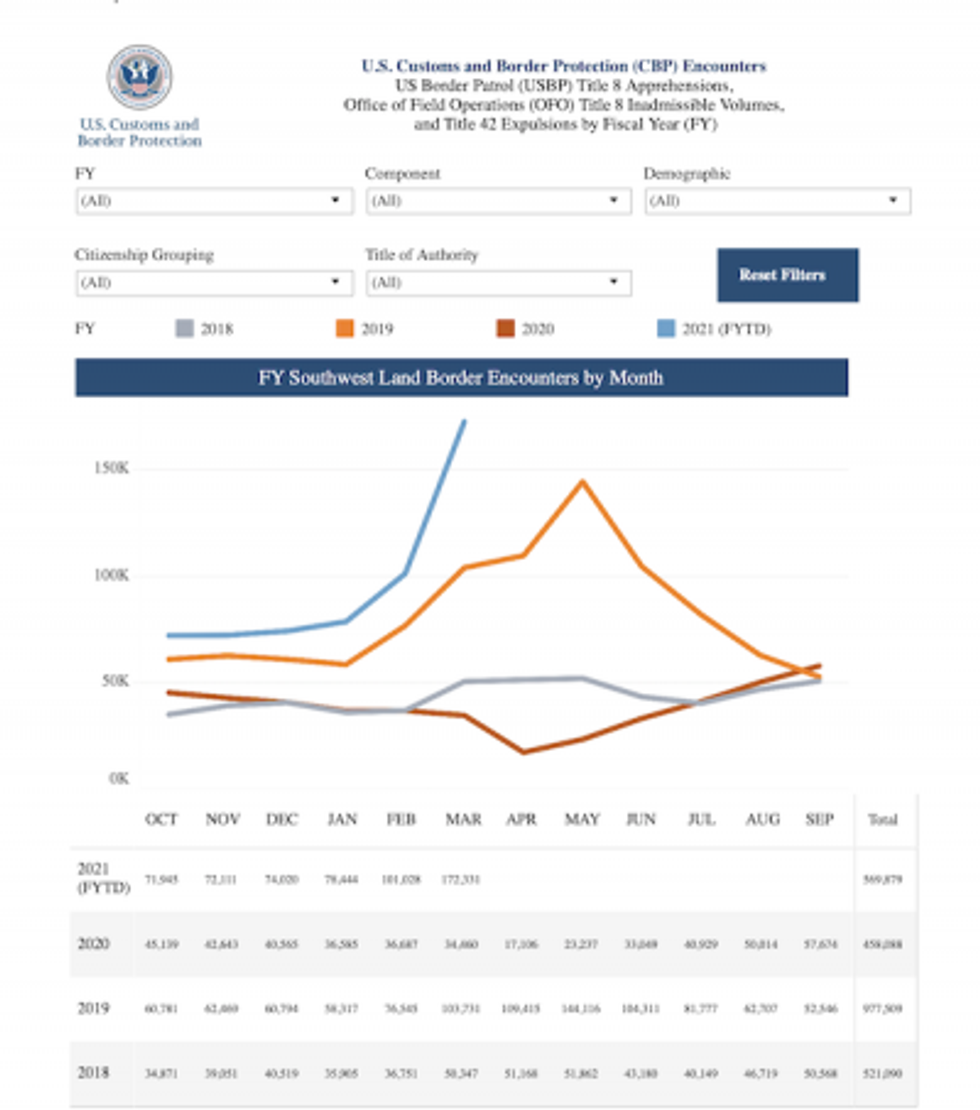Thomas Warrick was DHS Deputy Assistant for Counterterrorism Policy from August 2008 to June 2019 and is now Director of the Future of DHS Project and Nonresident Senior Fellow at the Atlantic Council.
OPINION — Border security is back on the front pages and needs urgent action to head off the crisis that’s coming. The March 2021 numbers of Department of Homeland Security encounters at the US southwest border are, almost literally, off-the-chart (see graphic). The Biden administration campaigned on major changes to immigration policies, and delivered on those promises with a combination of day-one executive orders and proposed legislation.
To some, especially Congressional Republicans and Trump supporters, southwest border security is an existential security threat that the Biden administration is failing to address. Everyone agrees the current system is broken, even if there’s no consensus on how to fix it.
The surge that’s coming needs to be treated simultaneously as a homeland security challenge, a humanitarian emergency, a foreign policy priority, and as a reason to kickstart the efforts required over the long term to more effectively manage the southwest border.
[caption id="attachment_34764" align="alignleft" width="400"]

Failure to address the coming crisis will have cascading consequences for other national security challenges. Success, on the other hand, would demonstrate the Biden administration’s ability to respond to fast-moving challenges beyond COVID-19.
The Biden administration has already taken a number of steps to address the surge, but it should be increasingly apparent that the solution will require an emergency infusion of cash for the Departments of Health and Human Services (HHS), Homeland Security (DHS), and Justice (DOJ). This surge will not wait until fiscal year 2022 starts in October 2021. Congress—especially the appropriations committees—need to act with the utmost urgency.
Many people misunderstand when this surge actually started. It started before the November 3 election. The start was less due to Biden administration policy pronouncements or post-January 20 executive orders and was more due to the simple fact—apparent to people in the “Northern Triangle” of Central America—that Joe Biden is not Donald Trump.
The Cipher Brief is proud to present an all-virtual International Summit. Join us for three days of expert-led sessions on China, western alliances, Intelligence, Space, and emerging technologies. Registration is free for Cipher Brief members. See how $10/month brings the most experienced national security experts to you.
Here at the Atlantic Council’s Future of DHS Project, which I lead, we were hearing in September 2020 from faith-based groups working in the Northern Triangle that human smugglers were starting to recruit migrants they could transport—at something on the order of $9,000 each—northward to the US border.
Months before the November 3 election, the “coyotes” were telling poor and desperate people to get to the United States to be first in line—even though the Biden team was trying to say clearly, as in a December 22 interview by senior transition officials, that “the Biden administration will need time to fix the situation.” The Associated Press reported then-President-elect Biden’s position in December 2020, saying “it will take months to roll back some of President Donald Trump’s actions on immigration.” Post-inauguration statements by Secretary of Homeland Security Alejandro Mayorkas also repeatedly made this clear. I
That perception among migrants being more important than policy pronouncements in Washington recalls the late 1992 efforts by Haitians, prior to President Bill Clinton’s inauguration, to build boats in anticipation of a policy change on Caribbean migration that did not happen. Reported statements by Haitians back then imbued Bill Clinton with the same aura of fundamental change that others bestow on President Biden today. I
The solution to the surge is not policy, because the situation is being driven by perceptions, not policy. The solution is money.
The most important key to dealing with the 2021 surge will be to increase processing capacity for asylum claims, while remaining true to American laws and values. The Biden administration has made some welcome changes, such as sending additional people to the border and proposing giving DHS officials the authorities to expedite a review of cases. These improvements will help but they aren’t likely to be sufficient.
What Congress needs to do in May 2021 is the same thing that Congress did during the Trump administration in June 2019: Lawmakers needs to pass an emergency supplemental appropriation to give HHS, DHS, and DOJ the necessary resources to expand capacity quickly.
In June 2019, with bipartisan support, Congress moved in a matter of weeks to appropriate $4.6 billion to address record-high monthly encounter numbers—numbers that the United States already exceeded in March 2021. Back in June-July 2019, this additional money, plus a drop in arrivals because of the summer heat, cleared up the backlog at the border within months, even though other policies did not change.
There is no substitute in a security and humanitarian crisis for ready cash. The government appropriations process is normally slow and deliberate, but the $1.9 trillion COVID-19 pandemic rescue shows Congress can move quickly when it needs to. Similarly, the $4.6 billion emergency supplemental in June 2019 happened quickly and was vital to resolving that year’s border security crisis.
The lesson for today to address the security and humanitarian situation at the southwest border, is that Congress needs to act now, and in a bipartisan way, as it did in June 2019. Lawmakers needs to urgently appropriate more money for DHS, DOJ and HHS to deal with the southwest border surge.
Read more expert-driven national security insights, perspective and analysis in The Cipher Brief












